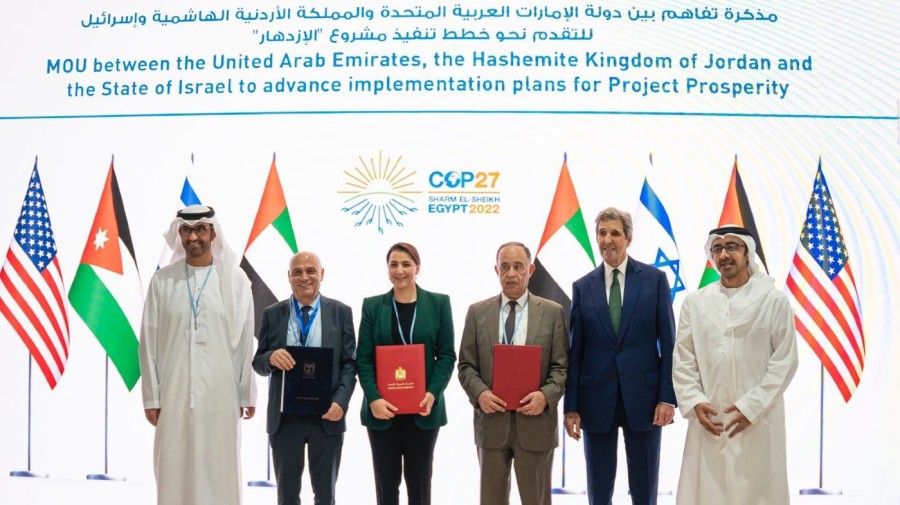
Israel and Jordan moved one step closer Tuesday to realizing a pivotal cross-border resource exchange — signing a memorandum of understanding on the sidelines of the United Nations climate change conference (COP27).
The agreement, signed in the presence of U.S. climate envoy John Kerry, advances a deal initially brokered by the United Arab Emirates last November in Dubai. The so-called “Project Prosperity” would facilitate a swap of Israeli desalinated water for Jordanian-generated solar energy.
Not only would the plans help quench the thirst of water-starved Jordan, but would also break Israel’s regional isolation as an “energy island.”
Tuesday’s memorandum highlights the mutual desire of the partners to cooperate in combatting the climate crisis, as well as tackle challenges in the fields of energy and water, according to a statement from the Israeli Energy Ministry.
“The signing of the Prosperity agreements opened a new page in relations between Israel and Jordan,” outgoing Israeli Energy Minister Karine Elharrar said, describing the project as “a geopolitical, economic and environmental opportunity.”
Elharrar, who has served as energy minister since June 2021, made headlines at COP26 in Glasgow, when she had to return to her hotel due to lack of wheelchair access at the venue.
After Israel’s recent national elections, in which outgoing Prime Minister Yair Lapid’s Yesh Atid party failed to achieve a majority against Benjamin Netanyahu’s Likud, Elharrar will lose her ministerial role.
The parties to the agreement intend to continue developing project implementation plans until COP28, which will be held next year in Dubai, according to the Energy Ministry statement.
As part of the initial agreement signed last year, the partners pledged to assess the feasibility of two projects: the first being a solar energy facility in Jordan capable of generating 600 megawatts annually for purchase by Israel.
In exchange, Israel would evaluate the possibility of selling 200 million cubic meters of desalinated water each year to Jordan, per the deal.
Over the past year, professionals on both sides of the border worked to develop comprehensive studies of the two projects — examining the economic, planning and regulatory aspects, according to the Israeli Energy Ministry.
The professional teams met frequently to lay the groundwork for the advancement of the project, the statement added.
With the signing of Tuesday’s memorandum, the countries expressed their intent to combat the climate crisis through cross-border cooperation, the Israeli Energy Ministry said.
“Today we are leaving the next government with a legacy of cross-border regional cooperation that creates hope for the entire region,” Israel’s outgoing Regional Cooperation Minister Esawi Frej said in a statement.
Frej, who signed the agreement on behalf of the country on Tuesday, stressed the importance of coming “together to promote the optimal utilization of natural resources.”
The project, he added, is “a legacy of action that proves the power of peace.”
For the latest news, weather, sports, and streaming video, head to The Hill.




